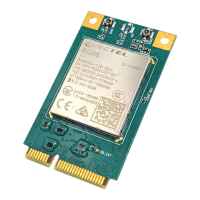3.2.4. Close a Connection
3.3. TCP Client Works in Buffer Access Mode under IPv6
3.3.1. Set up a TCP Client Connection and Enter Buffer Access Mode
+QIRD: 5 //The length of actually retrieved data is 5 bytes.
test1
OK
AT+QIRD=0,1500
+QIRD: 0 //No data in buffer.
OK
AT+QIRD=0,0 //Query the total length of received data, including read and unread data.
+QIRD: 5,5,0
OK
AT+QICLOSE=0 //Close a connection whose <connectID> is 0. Depending on the
network, the maximum response time is 10 seconds.
OK
AT+QIOPEN=1,0,"TCP","2001:468:2100:1:0:0:0:0",5001,0,0 //Context is 1 and <connectID> is 0.
Before using AT+QIOPEN, the host should
activate the context with AT+QIACT first.
OK
+QIOPEN: 0,0 //TCP client is connected successfully. It is
suggested to wait for 150 seconds for the
URC +QIOPEN: <connectID>,<err>. If the
URC cannot be received in 150 seconds,
the host can use AT+QICLOSE to close the
socket.
AT+QISTATE=1,0 //Query the connection status of socket
service 1.
+QISTATE: 0,"TCP","2001:468:2100:1:0:0:0:0",5001,11921,2,1,0,0,"usbmodem"
OK

